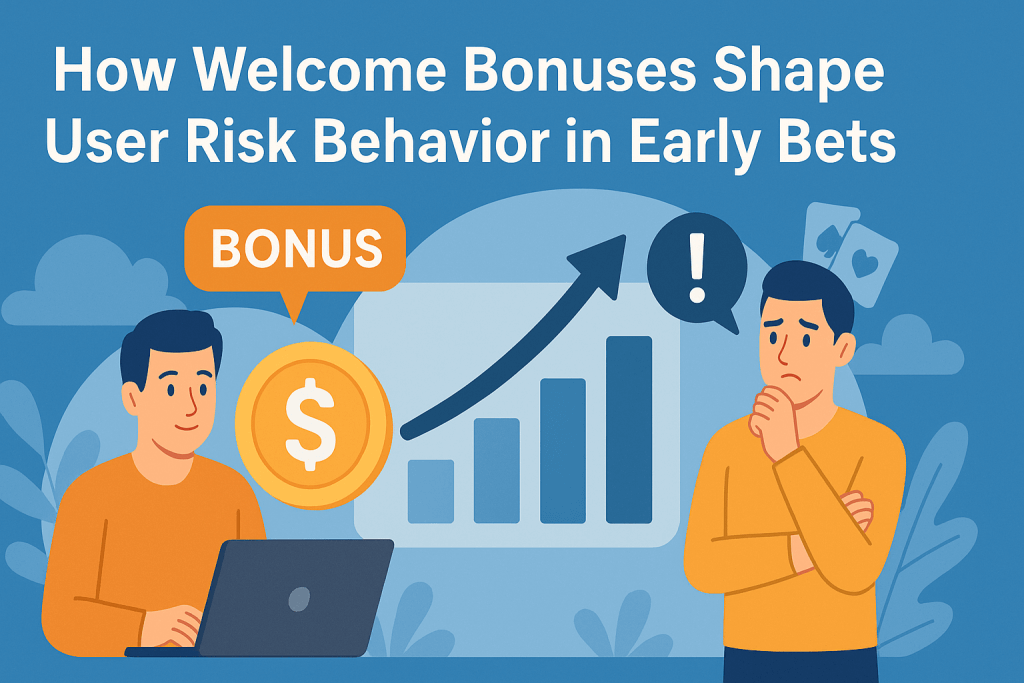It may seem that this copy is only a marketing gimmick – put a welcome bonus, and users will subscribe. But what can be done after that initial click turns it all around. The moment a new bettor enters the game with fun money, he or she is already impacted when it comes to his or her risk, timing, and decisions.
This subconscious force can determine long-term practices more than most people would think. This transitioning can be better caused when there is an idea of how and why, which is why it occurs, giving a greater idea into the platform strategy, even though it tells you a lot about user psychology as well.

Why Bonuses Affect First Bets More Than Odds Do
Odds create order. However, bonuses change the attitude.
It is not betting when the users place the initial stakes with the help of a welcome bonus; they are rather testing. There are low emotions involved because it is not their money. That commonly means:
- Attempting new sports or types of bets
- Betting on higher risk-reward margins that pay higher returns
- Overlooking conservative strategies which they could adopt otherwise
This is not irresponsibility. It is simple emotional detachment. Without the right financial consequence, risk is a less real phenomenon. When one bets with a bonus, the essence behind every click becomes different – and those platforms that comprehend this psychology exploit it in order to influence the initial user experience.
Platforms like the one found here often guide this process through bonus design and timing.
The Psychology of Not My Money
There’s a known behavioural effect: people treat money differently depending on its origin.
When it’s a bonus, users are more likely to:
- Ignore research or statistics
- Follow gut feeling or trends
- Place larger single bets rather than spread out smaller ones
The reason is that, bonus money does not provoke the same loss-aversion attitude as individual money does. Rather, it insists on what academics can only describe as an optimistic risk, a certain short-term brazenness which is unlikely to survive even the bonus itself.
Nevertheless, these early fliers are important. They form the basis of user experience. In case the bonus makes one make hasty/poorly informed plays, it can be transferred to the user. Intelligently designed bonuses, on the other hand, may prime intelligent, well-informed bettors right out of the gate.
Bonus Formats That Guide Better Decisions
The bonuses are not all that urge players to be very risky. As a matter of fact, others do it the other way around.
An excellent welcome bonus is able to:
- They need fewer minimum wagers on multiple games rather than a single big stake
- Promote cross-market/ sports play
- Take bets on the fair-middle rate (e.g. at odds 1.5-2.5)
The designs are confidence boosters but not reckless. Rather than inviting visitors on the site to place the dangerous bets they refer to as big bang bets, they engage in systematic exploration, making visitors learn about odds movement, bet timing, as well as how to respond in live play. It is not some kind of bonus. It is an educational device.
It is common in impediments like the one provided in this link that the frameworks seek to help the user adopt more balanced habits early enough in life.
Final Thoughts
The purpose of welcome bonuses does not stop at enticing the signups. They tone it down.
To a lot of bettors, a bonus is associated with the first win or loss. They learn something with that experience, odds, themselves and the rhythm of betting. Provided the initial encounter is an emotional one and not thoughtful, it is possible that it will take the users longer to adapt to smarter playing.
Conversely, a reward for patience, balance, and learning turns out to be bigger than a gift- it becomes the very first guide. And that is where strategy and psychology meet, where good platforms differ from ordinary ones.
And if you want to look at the effect of a bonus system on real-time play, have a look here.
